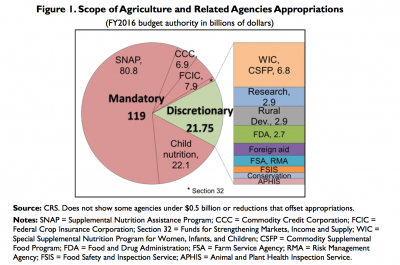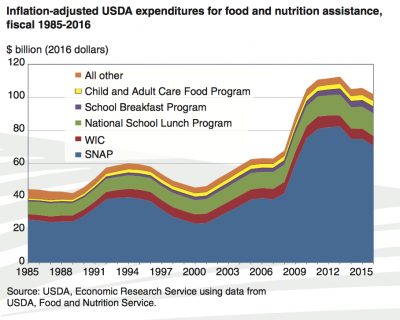House Agriculture Chair G.T. Thompson has tentatively scheduled a farm bill markup for the week of Feb. 23, according to three people familiar with the plans.
At Appropriations Hearing, Secretary of Agriculture Sonny Perdue Discusses White House Budget- Crop Insurance, SNAP
Yesterday, the House Appropriations Subcommittee on Agriculture held a hearing with Secretary of Agriculture Sonny Perdue to discuss the Administration’s priorities for the Department of Agriculture and to review the President’s proposed 2018 budget. Today’s update highlights two issues that lawmakers discussed at yesterday’s meeting: Crop Insurance and the SNAP (food stamps) program.
Background
In his prepared testimony, Secretary Perdue indicated that, “I am here today to present to you the Administration’s budget for the Department. The President’s Budget for 2018 for USDA programs within this Subcommittee is about $135 billion, of which approximately $122 billion is mandatory funding. The majority of these funds support crop insurance, nutrition assistance programs, farm commodity and trade programs and a number of conservation programs.”

Sec. Perdue added that, “For discretionary programs of interest to this Subcommittee, our budget proposes a net budget authority of about $13 billion, approximately $5 billion below the 2017 annualized continuing resolution. The Budget includes mandatory funds to fully support estimated participation levels for Child Nutrition programs and discretionary funds to fully serve the expected participation in the Special Supplemental Nutrition Program for Women, Infants, and Children. It includes the funding needed to meet our responsibility for providing inspection services to the Nation’s meat and poultry establishments.”
(Note: For more background on agricultural spending, see this FarmPolicyNews update from January, “Agricultural Appropriations: Mostly ‘Mandatory,’ Nutrition Related.”)
Chairman @USRepRodney & @Robert_Aderholt attend @USDA budget hearing with @SecretarySonny. pic.twitter.com/mTXfW7DwYI
— House Appropriations (@HouseAppropsGOP) May 24, 2017
Sec. Perdue also noted yesterday that, “Looking forward, I am sure there are many ways we can make USDA programs work better for the constituents we serve. Particularly as Congress works toward developing the next Farm Bill, I am prepared to work with Members and our stakeholders to seek solutions to our common challenges, while remaining accountable to the people.”
Crop Insurance
Writing about the White House budget proposal in yesterday’s Omaha World-Herald, Cole Epley explained that, “The president’s proposal to balance the budget with $3.6 trillion in spending cuts over 10 years includes caps on federal subsidies paid to farmers for crop insurance at $40,000. It would also eliminate a program that helps insulate farm revenues from market volatility.
“Smaller line items would impose means testing to qualify for crop insurance, for which there was no previous qualification, and another change would reduce by about 45 percent the gross income cap for farmers to qualify for programs that pay out when commodity prices fall below a fixed level.
“The new adjusted gross income threshold for those proposals would be $500,000.”
Yesterday’s article noted that, “[Tony Jesina, senior vice president for services including crop insurance at Omaha-based Farm Credit Services of America] was quick to volunteer his ideas on what could happen if Congress takes the president’s advice and slashes funding for the programs.
If the new budget makes crop insurance more expensive, as he thinks it could, more farmers could decide to buy less coverage or totally go without it — potentially leaving Farm Credit with no choice but to stop lending them money. That’s because the lender requires borrowers to have insurance to account for risks that could thwart a would-be crop.
“‘Why would we want to jeopardize our food safety and security?’ Jesina said.”
In his opening comments at yesterday’s hearing, Subcommittee Chairman Robert Adherholt (R., Ala.) noted that, “I am especially concerned about the major changes proposed to the crop insurance program. The budget request includes proposals that would reduce crop insurance funding by nearly $30 billion over 10 years despite the continuing decline in net farm income of 56 percent from its recent high of $123.3 billion in 2013. Farmers continue to experience tough economic times with sharply decreasing crop prices and a number of natural disasters.”
Rep. Kevin Yoder (R., Kans.) also discussed crop insurance issues yesterday, stating that, “And so I noted in the President’s budget request a 36% reduction over ten years to crop insurance. And I thought I’d give you a chance to discuss the value of crop insurance, how you might see these reductions going, and how important it is to maintain this program to create a safety net for farmers.
“And I also note that the agriculture economy is really struggling right now. You know, I grew up in the ‘80s, in which we saw a lot of our neighbors go bankrupt and worried that the same thing was going to happen to us. And in 2017 commodity prices aren’t where they need to be, and so I just, you know, the safety net is critical to farmers who are struggling to maintain their farms at this point.”
Sec. Perdue responded by saying that, “I think you won’t get any disagreement with me regarding the value of crop insurance.”
He added that, “Farming is expensive. It has a lot of risk involved in it. I doubt that many of us today would want to put almost all of our equity in the ground looking for a seed to come up each year. So we know the dedication of them, and our nation is the beneficiary of their risk-taking and those values that you describe. Crop insurance is an integral part of that, how we right size that.
“I think the goal for the farm bill—and these are obviously policies, as you know, that will be really determined in the 2018 Farm Bill. So from the budget perspective, there will be a lot of discussion over these going forward. My goal, my principle, I guess, as USDA Secretary, as we help to advise and consult as you all deal with the farm bill, is devise programs that let the market determine what people plant.”
SNAP (Food Stamps)
Recall that the White House budget proposal included cuts to the SNAP program that totaled around $193 billion.
Rep. Rosa DeLauro (D., Conn.), in her questions to Sec. Perdue, stated that, “And my hope is that this budget document is dead on arrival because I believe it cruel, I believe it heartless, and I believe it inhumane.
“And let me get to an issue that’s very near and dear to my heart, and that is the food stamp program. And before the House Agriculture Committee on the State of Rural Economy, you stated—and this is a quote—’SNAP has been a very important, effective program,’ and that as far as you are concerned, quote, ‘we have no proposed changes.’
“You don’t try to change things that are broken. And when the motto is do right and feed everyone, do you still—and I have to ask you for ‘yes’ or ‘no,’ because my time is gonna be limited—do you still feel those words to be true?”
Sec. Perdue responded by saying, “Absolutely.”

Rep. DeLauro indicated that, “Okay. The reason I ask is because the statement is not at all aligned with the administration’s proposal to completely gut the food stamp program. If you feel that the SNAP program is not broken, and that we should do right by feeding everyone, why are we proposing a $193 billion cut, over 25%, and take away the benefits to some of our most vulnerable populations?
“SNAP works, and it works for those who need it the most. It has been incredibly successful in alleviating hunger, lifting people out of poverty, and supporting our economy. This is wrongheaded and flies in the face of what apparently is your mission, which is to make sure we do right and feed everyone. Millions of people will be thrown off the food stamp program because of this heartless budget.”
Testifying on @POTUS budget, which asks for efficiency serving taxpayers. At @USDA, we'll fulfill core mission & manage to funds provided. pic.twitter.com/UdBpHL9lZN
— Sec. Sonny Perdue (@SecretarySonny) May 24, 2017
During the exchange, Sec. Perdue noted that, “We knew, and in the wise creation of the supplemental nutrition program was a temporary program really for unemployment there. We know what the unemployment levels are compared to where they peaked in previous years, and we see those going down. That’s why we’ve been able to achieve some savings there.”
Rep. DeLauro responded by saying:
$193 billion is not achieving some savings. It’s gutting a program.
Rep. DeLauro also stated yesterday that, “In the 2008 Farm Bill, on a bipartisan basis, we worked through this. We made sure that food stamp benefits were indexed to inflation, that we changed the asset level so that more people could be included. We dealt with the minimum benefit and the maximum benefit, and it was on a bipartisan basis.
“And subsequent to that, this program has worked, and it’s worked as it should. In difficult times, people have the opportunity to take…to be able to get a hand up. Most people are on food stamps for between eight and ten months. It is not forever.
“And to go after this program in this way, as I said, it is not about the values of this great nation and what we are about. We don’t stop feeding children. Robert Kennedy says in a nation of abundance, poverty is evil. And this is evil if we do this.”
And Subcommittee Ranking Member Sanford D. Bishop, Jr. (D., Ga.) indicated yesterday that, “I, and virtually all of my colleagues who value the admonitions from Jesus in the 25th chapter of Matthew regarding the ‘least of these,’ are strongly opposed to this wrong-headed attempt to save money by cutting a program that helps children, seniors, people with disabilities, veterans, and adults struggling with low wages and/or temporary joblessness to avoid hunger. These proposals do not match our Nation’s values and fail the test of basic human decency. We as a Nation can and should do better for the most vulnerable among us.”





